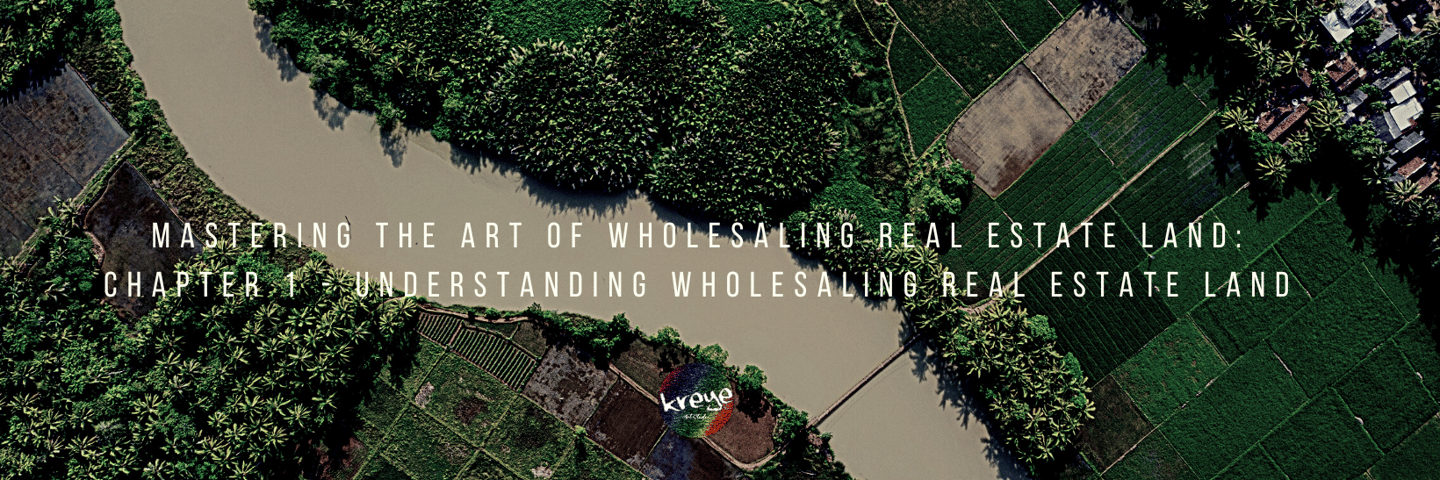Mastering the Art of Wholesaling Real Estate Land: Chapter 1 - Understanding Wholesaling Real Estate Land
REAL ESTATE


Chapter 1: Understanding Wholesaling Real Estate Land
Section 1: Introduction
Wholesaling real estate land is a captivating avenue within the broader realm of real estate transactions. To embark on this journey successfully, it's paramount to grasp the fundamental principles that underpin land wholesaling. This chapter serves as a comprehensive guide, exploring the intricacies of wholesaling land transactions, elucidating the roles of key players, and illuminating the challenges and opportunities that shape the landscape of land wholesaling.
Section 2: Defining Wholesaling in the Context of Land Transactions
At its core, wholesaling within the real estate sector involves facilitating property transactions with the aim of avoiding long-term ownership. This strategy, often executed with properties in the built environment, is equally applicable to land transactions. Wholesaling land entails acting as a conduit between motivated sellers and prospective buyers, orchestrating swift transactions while reaping a fee for the service. However, land wholesaling has distinctive features owing to the inherent dissimilarities between raw land and developed properties.
Land transactions, in their essence, encompass the transfer of ownership rights to a parcel of land. Wholesaling land requires identifying motivated sellers eager to sell quickly and buyers in search of investment prospects or development prospects. Wholesalers function as intermediaries, profiting from the difference between the purchase and sale prices.
Section 3: Key Players in Land Wholesaling
Motivated Sellers: Central to the land wholesaling ecosystem are motivated sellers – landowners driven by various factors to pursue swift sales. These factors may encompass financial exigencies, inheritance-related considerations, relocation, or shifts in personal circumstances. Wholesalers are responsible for identifying these sellers and initiating negotiations to acquire properties at discounted rates.
Wholesalers: Wholesalers specialize in identifying motivated sellers, negotiating favorable deals, and then assigning these contracts to potential buyers. Their prowess lies in their capacity to unearth undervalued land, negotiate astutely, and oversee transactions seamlessly.
Buyers: Buyers, often comprising investors, developers, or individuals with an appetite for land investments, constitute the demand side of the equation. These buyers seek properties that possess the potential for future development, appreciation, or other forms of financial return.
Title Companies and Attorneys: The mechanics of a land transaction require the expertise of professionals who specialize in ensuring the legality and smooth execution of the process. Title companies and attorneys perform title searches, manage paperwork, and verify that the transfer of ownership adheres to legal stipulations.
Real Estate Agents: While not always the central figure in land wholesaling, real estate agents can play a role by presenting potential deals to wholesalers or assisting buyers in identifying suitable properties.
Section 4: Challenges and Opportunities in Land Wholesaling
Market Research and Valuation: Land is multifaceted, encompassing commercial, residential, agricultural, and other categories. Thorough comprehension of local market dynamics, zoning regulations, and potential land uses is pivotal for precise valuation. Overlooking these factors can lead to overestimation or missed opportunities.
Negotiation Skills: The cornerstone of wholesaling lies in effective negotiation. Wholesalers must engineer deals that appeal to both sellers and buyers while safeguarding their own profit margins. Striking this balance demands finesse and mastery.
Legal Considerations: Land transactions harbor intricate legal dimensions, ranging from property rights and easements to zoning ordinances and environmental assessments. Navigating these complexities necessitates comprehensive familiarity with regional laws and regulations.
Marketing and Networking: Building a network of motivated sellers and potential buyers is pivotal. Wholesalers must harness effective marketing strategies – encompassing online platforms, direct mail, and networking events – to establish a robust industry presence.
Due Diligence: Thorough due diligence is imperative to circumvent acquiring land encumbered with latent issues such as liens, encumbrances, or environmental hazards. Neglecting due diligence can culminate in unforeseen expenses and legal entanglements.
Fluctuating Market Conditions: The real estate landscape, including land, is susceptible to cyclical fluctuations. Wholesalers must exhibit adaptability, identifying opportunities during upswings and mitigating risks during downturns.
Section 5: Conclusion
In summation, wholesaling real estate land emerges as a multifaceted endeavor that demands a profound comprehension of the real estate arena, negotiation acumen, legal acuity, and adept networking. This chapter has served as the bedrock for appreciating the essence of land wholesaling, expounding on the functions of principal stakeholders, and delineating the challenges and opportunities that await those who venture into this realm. As this odyssey unfolds, aspiring wholesalers must equip themselves with erudition, adaptability, and a strategic mindset to flourish in this dynamic domain within the universe of real estate. Through judicious navigation, diligent effort, and sagacious decision-making, success within the realm of wholesaling real estate land is undoubtedly attainable.


